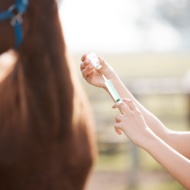Study looks at how domestic rabbits become feral
“We hope that this study will help lawmakers understand the importance of preventing domestic animals from being released into the wild" - Leif Andersson.
A new study has uncovered the genetic changes that help domestic rabbits re-adapt to living back in the wild.
The researchers, who looked at the DNA of almost 300 rabbits from three continents, found that many of the characteristics which have been bred into rabbits as part of their domestication are lost through natural selection in feral populations.
Genomes of 297 Europeans rabbits (Oryctolagus cuniculus) from Europe, South American and Oceania were sequenced by scientists from Texas A&M School of Veterinary Medicine and Biomedical Sciences (VMBS), USA, in collaboration with the Research Center in Biodiversity and Genetic Resources, Portugal.
To their surprise, the researchers found that the rabbits from introduced populations had a mix of feral and domestic DNA.
Leif Andersson, a professor in the VMBS’ Department of Veterinary Integrative Biosciences and a professor at Uppsala University in Sweden, said: “This was not what we had expected to find — we expected that feral rabbits were domestic rabbits that have somehow relearned how to live in the wild.
“But our findings show us that these rabbits already had a portion of wild DNA helping them survive in nature.”
The genetic changes in feral rabbit populations not only included genes that influence things such as coat colour, but also genes that affect elements of behaviour such as tameness.
Rabbits have been introduced by humans around the world, sometimes with a significant impact on local environments and ecosystems. The researchers are hopeful that the study will offer insights for those looking at other feral populations.
Dr Andersson added: “We hope that this study will help lawmakers understand the importance of preventing domestic animals from being released into the wild.
“This project has helped us understand not only how rabbits become feral but also how other species like pigs and cats can become feral nuisances.”
The study has been published in the journal Nature Ecology and Evolution.
Image © Shutterstock



 Zoetis UK has apologised for a supply shortage of Equip Artervac, caused by a manufacturing issue.
Zoetis UK has apologised for a supply shortage of Equip Artervac, caused by a manufacturing issue.